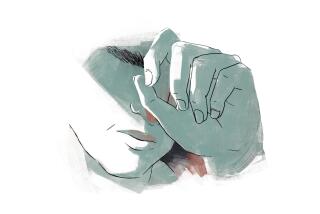Health Officials Cast Web at STDs
When it comes to sex, the Web has a dark side: It helps people hook up with strangers, fueling the spread of disease.
But recently, health authorities in Los Angeles, San Francisco and other cities have been trying to use the Internet for healthier purposes.
They are hiring counselors to visit sex chat rooms, advertising often provocative prevention messages, arranging testing for sexually transmitted diseases (STDs) and even helping to notify -- via online postcards -- the partners of people found to be infected.
One site, itrick.org, appears to be the 21st-century version of the little black book. It lets people keep track of all their sexual partners -- including height, weight, photos and contact information -- and can be used to send out a mass e-mail if a user learns that he has a transmissible disease.
Some privately operated websites are helping people select mates according to whether they use condoms or not, or whether they are HIV positive or negative (a practice known as “sero-sorting”). Last week, sero-sorting was cited by AIDS agencies in San Francisco as one possible explanation for why the city’s HIV infection rates are estimated to have dropped 10% in the last five years.
“Clearly, we are at the beginning of tapping this technology” in our favor, said Dr. Ronald Valdiserri of the National Center for HIV, STD and TB Prevention at the U.S. Centers for Disease Control and Prevention. “We’re starting to find that we can use the Internet to help reach people in ways we couldn’t otherwise.”
“The Internet removes the embarrassment factor, so people can honestly talk about what they are doing and what their risks are,” said Deborah Levine, director of the nonprofit Internet Sexuality Information Services, which has teamed with half a dozen U.S. cities to promote STD prevention online.
Because disease prevention online is so new, it is unclear how well it works. But that isn’t stopping innovative attempts at online prevention in both the public and private sectors.
A growing number of websites are aimed at the general population, but most have focused primarily on gay and bisexual men.
Last fall, the CDC reported that the rate of new diagnoses among gay and bisexual men, which had been stable for the last few years, rose 8% over the previous year. A separate report issued by the agency showed a 29% rise in syphilis over the last four years in the same group.
Research shows that people who meet on the Web are likelier to engage in risky behavior and to have a sexually transmitted disease. A recent study found that nearly a quarter of 587 gay men in Los Angeles diagnosed with syphilis had met one or more sexual partners on the Internet around the time they were infected. Two-thirds of the men who met partners on the Internet were also infected with HIV.
“Hooking up online has become many people’s single biggest sexual outlet, more than bars or clubs or bathhouses,” said Levine, whose nonprofit group, with the San Francisco Department of Public Health, recently opened the website hookinguponline.org to promote safe sex online.
Now the Internet is the place some people turn to after acquiring an infection. After he was diagnosed with HIV two years ago, Ron Loggi eventually found Poz.com, a website for men who have the virus.
The 35-year-old social work student from Los Angeles began dating, and over the past year, has been in a relationship.
“I prefer to sero-sort,” he said, using the in-vogue verb. “It’s easier and you don’t have to worry about transmission.”
Carl Lucania, a 45-year-old information and technology manager in San Francisco, turned to the Internet for a different reason: to ensure that he stays HIV-negative.
Last year, Lucania started using a website, which was set up by the San Francisco Department of Public Health, that allows users to download lab slips on their computers, then anonymously visit a testing center. Days later, they can log on to the site for the results. He said he had gotten negative results each of the three times he used the service.
“Anything that gets people who are sexually active to get tested is a good idea to me,” Lucania said.
For people who learn that they are infected, Los Angeles County unveiled inspotla.org, a site that allows them to anonymously notify sex partners that they too should be tested. At the website, which is co-sponsored by the nonprofit AIDS Healthcare Foundation, users can choose from six electronic postcards to send to their partners.
Some sites cater to specific groups. On Valentine’s Day, AIDS Project Los Angeles introduced mysexycity.com, an interactive site aimed at young gay men that allows them to practice navigating risky sexual situations with animated characters. Unsafe choices lead characters to become infected. The site has attracted a quarter of a million visitors in the last six weeks, the agency said.
Existing sex sites are providing entree for AIDS educators. Manhunt.net, a popular gay sex site with 600,000 registered users across the country, recently began providing free advertising space to nearly 100 public health agencies and allowing counselors to answer sex-related questions.
Jeff Bailey, director of education at the Los Angeles Gay and Lesbian Center, said counselors identify themselves on such sites as Manhunt.net and myspace.com with online names such as letstalkaboutsex and askmeabouthealth, and then pass along tips.
“The traditional outreach of us going out into the field with condoms isn’t working,” said Bailey, adding that online outreach can be much cheaper.
Of course, too much online prevention could turn people off. What’s more, online efforts across the country remain uneven and disconnected.
Last year, the Centers for Disease Control and Prevention reviewed online prevention programs in eight cities.
It found that cities such as Atlanta and Miami trailed others such as Los Angeles and San Francisco -- sometimes because of practical obstacles such as firewalls that keep city employees from accessing sex sites on their computers.
In the end, though, patients such as Loggi of San Francisco have very simple, traditional advice for people who want to ensure they don’t contract a disease.
“Just wear a condom,” he said. “Don’t end up like me.”






